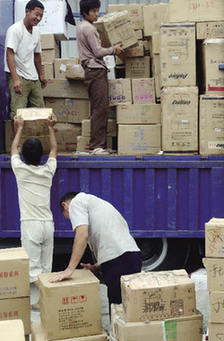|
Is the logistics industry merely transportation? Li Yining, dean of the Peking University's Guanghua School of Management, commented, "The logistics industry has extensive functions, including the distribution of goods, chain operations, pre-production and after-production service, processing for export, storage and transportation, and E-business." Professor Li Yining holds that this industry can provide many jobs and play a big role in promoting production and stimulating consumption.
Furthermore, Li Yining also holds that the logistics industry is a basic industry that serves other trades and is of vital importance in improving the performance of the entire economy. However, the domestic logistics industry is backward, and lags far behind developed countries in both facilities and management. China's logistics expenditure takes up 18 percent of GDP, while the figure in the United States is less than 10 percent. Management cost makes up 12 percent of the total logistics expenditure, while in the United States this figure is less than 5 percent. Therefore, it is in time to launch a revitalization plan for China's logistics industry.
Building a Modern Logistics Network
The urban logistics system needs revitalization, while the rural logistics system needs pioneering development. According to the Readjustment and Revitalization Plan of the Logistics Industry, the government will adopt four measures to develop the logistics industry, including "strengthening construction of logistics infrastructure facilities, and raising the standardization and informatization levels of logistics." It emphasizes promoting the development of logistics in key areas such as agricultural products and medicines.
"Building a modern logistics network covering both urban and rural areas is an organizational guarantee to stimulate domestic demand and expand consumption," said Zhang Zhigang, a member of the National Committee of the CPPCC and former deputy minister of Commerce. He told this reporter that the modern logistics distribution system in cities for supermarkets, e-business and the "10,000-village, 1,000-township project" in rural areas are an important part of the modern distribution network.
The "10,000-village, 1,000-township project" was launched by the Ministry of Commerce in 2005. In a period of three years, it planned to build 250,000 rural shops in experimental areas, forming a rural retailing operation network led by shops in urban districts, with township shops as the backbone, and village shops as the basis, so as to gradually narrow the consumption gap between urban and rural areas.
Cheng Guoqiang, deputy president of the Institute of the Market Economy under the Development Research Center of the State Council, has made extensive investigation trips to the rural areas of Shaanxi, Hubei and Guangdong provinces. From his many years of experience at the grassroots he knows how serious the shortage of basic distribution facilities in the countryside is.
"In many localities basic parts of the infrastructure such as roads and water supplies for agricultural wholesale markets are obsolete. The IT and cold storage facilities are incomplete, and the service functions are too simple. Some wholesale markets lack service facilities such as information services, quality testing, transaction settlements, safety monitoring and garbage treatment," said Cheng Guoqiang.
 |
|
Workers of a private logistics company in Zhengzhou City. |
|
